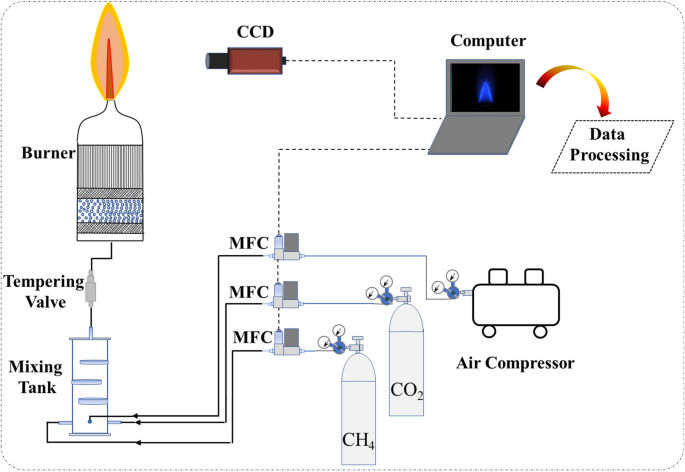Effect of CO2 dilution on laminar burning velocities, combustion characteristics and NOx emissions of CH4/air mixtures
IF 8.7
1区 工程技术
Q2 ENERGY & FUELS
International Journal of Coal Science & Technology
Pub Date : 2023-11-13
DOI:10.1007/s40789-023-00655-9
引用次数: 0
Abstract
Abstract The laminar combustion characteristics of CH 4 /air premixed flames with CO 2 addition are systemically studied. Experimental measurements and numerical simulations of the laminar burning velocity (LBV) are performed in CH 4 /CO 2 /Air flames with various CO 2 doping ratio under equivalence ratios of 1.0–1.4. GRI 3.0 mech and Aramco mech are employed for predicting LBV, adiabatic flame temperature (AFT), important intermediate radicals (CH 3 , H, OH, O) and NO x emissions (NO, NO 2 , N 2 O), as well as the sensitivity analysis is also conducted. The detail analysis of experiment and simulation reveals that as the CO 2 addition increases from 0% to 40%, the LBVs and AFTs decrease monotonously. Under the same CO 2 doping ratio, the LBVs and AFTs increase first and then decrease with the increase of equivalence ratio, and the maximum of LBV is reached at equivalence ratio of 1.05. The mole fraction tendency of important intermediates and NO x with equivalence ratio and CO 2 doping ratio are similar to the LBVs and AFTs. Reaction H + O 2 ⇔ O + OH is found to be responsible for the promotion of the generation of important intermediates and NO x under the equivalence ratios and CO 2 addition through sensitivity analysis. The sensitivity coefficients of elementary reactions that the increasing of CO 2 doping ratio promotes or inhibits formation of intermediate radicals and NO x decreases. Graphical abstract

CO2稀释对CH4/空气混合物层流燃烧速度、燃烧特性和NOx排放的影响
系统研究了添加co2的ch4 /空气预混火焰的层流燃烧特性。在当量比为1.0 ~ 1.4的条件下,对不同co2掺杂比的ch4 / co2 /Air火焰层流燃烧速度(LBV)进行了实验测量和数值模拟。采用GRI 3.0模型和Aramco模型对LBV、绝热火焰温度(AFT)、重要中间自由基(CH 3、H、OH、O)和nox排放量(NO、NO 2、n2o)进行预测,并进行敏感性分析。实验和模拟的详细分析表明,随着co2添加量从0%增加到40%,LBVs和AFTs单调降低。在相同CO 2掺杂比下,随着等效比的增大,LBV和aft先增大后减小,在等效比为1.05时达到最大值。等效比和CO 2掺杂比下,重要中间体和NO x的摩尔分数趋势与LBVs和AFTs相似。通过敏感性分析,发现反应H + o2⇔O + OH促进了重要中间体和NO x在等比值和CO 2加入下的生成。随着CO 2掺杂比例的增加,促进或抑制中间自由基和NO x生成的元素反应敏感性系数减小。图形抽象
本文章由计算机程序翻译,如有差异,请以英文原文为准。
求助全文
约1分钟内获得全文
求助全文
来源期刊
CiteScore
11.40
自引率
8.40%
发文量
678
审稿时长
12 weeks
期刊介绍:
The International Journal of Coal Science & Technology is a peer-reviewed open access journal that focuses on key topics of coal scientific research and mining development. It serves as a forum for scientists to present research findings and discuss challenging issues in the field.
The journal covers a range of topics including coal geology, geochemistry, geophysics, mineralogy, and petrology. It also covers coal mining theory, technology, and engineering, as well as coal processing, utilization, and conversion. Additionally, the journal explores coal mining environment and reclamation, along with related aspects.
The International Journal of Coal Science & Technology is published with China Coal Society, who also cover the publication costs. This means that authors do not need to pay an article-processing charge.

 求助内容:
求助内容: 应助结果提醒方式:
应助结果提醒方式:


